When it comes to pest control in Melbourne, wasps are among the most common and concerning insects that homeowners and businesses encounter. These insects, known for their painful stings and aggressive behavior, can pose significant risks to both people and pets. Understanding the different types of wasps found in Melbourne is crucial for effective wasp control.
In this blog, we’ll explore the various species of wasps in the region, the potential dangers they pose, and how 7 State Pest Control can help you manage and eliminate these unwelcome pests.
Common Types of Wasps in Melbourne
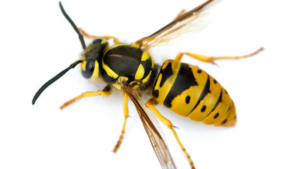
The European Wasp is one of the most prevalent wasp species in Melbourne. Originally from Europe, this species has adapted well to the Australian climate. These wasps are easily recognizable by their yellow and black bodies, which can sometimes be mistaken for bees. However, unlike bees, European Wasps are much more aggressive and are known to sting multiple times when threatened.
Characteristics:
- Yellow and black striped body
- Nests are often found in walls, roofs, or underground
- Attracted to sweet foods and meats
Dangers:
- Aggressive and capable of stinging multiple times
- Can cause allergic reactions in some individuals
- Known to invade homes and outdoor spaces
Prevention Tips:
- Keep food and drinks covered when outdoors.
- Regularly check your property for any signs of wasp nests.
- Seal cracks and crevices around your home to prevent wasps from entering.
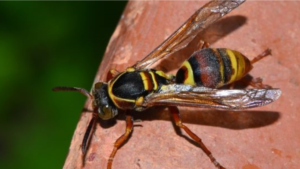
Paper Wasps are another common wasp species in Melbourne. These wasps are less aggressive than European Wasps but can still pose a threat if their nests are disturbed. Paper Wasps get their name from the paper-like material they use to build their nests, which are often found hanging from eaves, trees, and other sheltered locations.
Characteristics:
- Slender bodies with long legs, often reddish-brown or yellow
- Nests resemble an upside-down umbrella made of paper-like material
- Less aggressive but will sting if provoked
Dangers:
- Stings can be painful and cause allergic reactions
- Nests near homes can lead to encounters with humans
- Often found in gardens and near outdoor structures
Prevention Tips:
- Regularly inspect outdoor areas like eaves and trees for new nests.
- Avoid leaving sugary substances or food scraps in your garden.
- Trim back overhanging branches and bushes where nests could form.
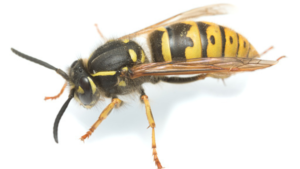
Yellow Jackets are another wasp species that are often mistaken for bees due to their similar appearance. These wasps are highly territorial and can become aggressive if their nests are threatened. Yellow Jackets are known for building their nests in the ground, making them particularly dangerous for people who unknowingly step on or disturb them.
Characteristics:
- Bright yellow and black patterned bodies
- Ground-dwelling nests, often in old burrows or other cavities
- Extremely aggressive, especially when their nest is disturbed
Dangers:
- Multiple stings from a single wasp
- Potential for severe allergic reactions
- Their nests can be difficult to locate, leading to unexpected encounters
Prevention Tips:
- Be cautious when walking through grassy areas, especially in summer.
- Clear away fallen fruit and other debris that might attract Yellow Jackets.
- Consider hiring professional pest control services to identify and treat hidden nests.
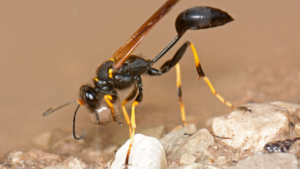
Mud Daubers are less aggressive wasps that are known for their unique nesting behavior. They build their nests out of mud, often on walls, under eaves, or in sheltered areas. Unlike other wasp species, Mud Daubers are solitary and rarely sting unless directly threatened.
Characteristics:
- Long, slender body with a narrow waist
- Nests made of mud tubes, often found in protected areas
- Non-aggressive and generally solitary
Dangers:
- Although not aggressive, their presence can still be unsettling.
- Their nests can be unsightly and may damage property over time.
- They can sting if they feel threatened, though it’s rare.
Prevention Tips:
- Regularly inspect and remove mud nests before they become established.
- Ensure that your home’s exterior is well-maintained and free of cracks or crevices.
- Use natural repellents like peppermint oil to discourage wasps from nesting.
How to Identify a Wasp Nest
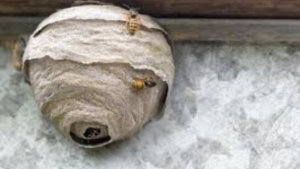
Identifying a wasp nest early can help prevent an infestation from getting out of control. Here are some common signs to look out for:
- Visual Identification: Wasps often build their nests in sheltered locations like roof eaves, trees, or underground burrows. Look for structures resembling paper-like combs or mud tubes.
- Increased Wasp Activity: If you notice an unusual number of wasps in a specific area around your home, it’s likely that there’s a nest nearby.
- Noise: Wasp nests, especially those in walls or roofs, can produce a buzzing sound, particularly if the nest is large and active.
The Importance of Professional Wasp Control
Wasps are not only a nuisance but can also pose serious health risks, especially to those with allergies to their stings. Attempting to remove a wasp nest on your own can be dangerous, as these insects can become highly aggressive when their nests are threatened. That’s why it’s essential to seek professional help when dealing with wasps.
At 7 State Pest Control, we specialize in wasp control services in Melbourne. Our experienced team understands the behavior and nesting habits of different wasp species, allowing us to effectively locate and remove nests from your property. We use safe and environmentally friendly methods to ensure that wasps are eliminated without posing any further risk to you, your family, or your pets.
Wasps can be a significant problem in Melbourne, especially during the warmer months. Knowing the different types of wasps in the area and the dangers they pose is the first step in protecting your home or business. If you’re dealing with a wasp infestation or want to prevent one, 7 State Pest Control is here to help. Our professional wasp control services are designed to safely and effectively remove wasps from your property, giving you peace of mind and a safer environment.
For more information about our wasp control services, contact us today & schedule an inspection. Let us help you keep your home or business wasp-free!
